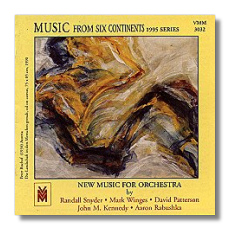
The Internet's Premier Classical Music Source
Related Links
- Latest Reviews
- More Reviews
-
By Composer
-
Collections
DVD & Blu-ray
Books
Concert Reviews
Articles/Interviews
Software
Audio
Search Amazon
Recommended Links
Site News
 CD Review
CD Review
Music from Six Continents

– 1995 Series –
- Randall Snyder: Namdaemun (1993) 1
- Mark Winges: Aural Colors (1992) 2
- David Patterson: Hermit's Blue (1991) 1
- John M. Kennedy: Portrait… (1989) 4
- Aaron Rabushka: Concerto for Harp & Chamber Orchestra 3
3 Adriana Antalová, harp
1 Moravian Philharmonic Orchestra/Ruben Silva
2 Rohnert Park Symphony Orchestra/J. Karla Lemon
3 Bohuslav Martinů Philharmonic Orchestra/Milos Machek
4 University of Michigan Symphony Orchestra/Gustav Meier
Vienna Modern Masters VMM 3032
Written when the composer was remarkably young, and in a neoclassical style unusual in the late '70's, Rabushka's Concerto for Harp & Chamber Orchestra is one of the outstanding concertos written in our time. It is beautiful as well as exciting. Quite a substantial work at nearly 27 minutes, it deserves to enter the repertoire. For me, it had immediate appeal, and it has proved its staying power through many re-hearings.
In three movements played without pause, and lightly scored, with prominent solos for flute and oboe, this work get more interesting as it goes along. The first movement begins with the strings playing a rounds-like melody but continues with a second theme on the flute which defeats the expectation one might have had. Harmonically, there is definite tonality, chromaticism, and bitonality.
The second movement (lento) is highly unusual, beginning with a double bass solo, in what the composer calls a rhapsodic manner, followed by a very restful passage for the harp (almost approaching the silences achieved in Rochberg's Slow Fires of Autumn). This peace is suddenly interrupted by what I want to call a high shriek by the upper strings and oboe, in a gesture that Mahler or Schubert (adagio of the string quintet) might have given a grim nod. In his very helpfprogram note Rabushka makes no mention of any expressive intent, nor is he likely to confirm my impression, I think, but this is how I hear it.
The finale, a rondo, is the longest (11:48) and most complex movement, and quite exciting. Some of the melody and harmony sounds Mid-Eastern. I can imagine the finale danced. In fact, it would be satisfying to see what a good choreographer could do with the whole concerto. (I can visualize a scenario, but as I am not a choreographer, I shall keep it to myself.)
The performance of this work is by the Bohuslav Martinů Philharmonic Orchestra, Milos Machek conducting in the composer's presence. The harp soloist is Adriana Antalova. There are several other works on the disc but this is the one that stands out, for me.
Copyright © 1997, 1999, R. James Tobin


















